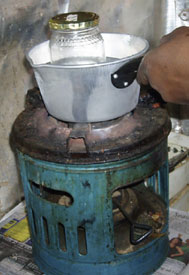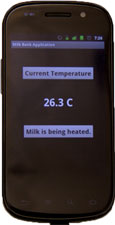Mobile phones help to prevent HIV transmission in breast milk
January / February 2012 | Volume 11, Issue 1

Photo courtesy of Rohit Chaudhri
A mobile phone with temperature
probe allows women to pasteurize
their breast milk correctly, preserving
nutrients but deactivating HIV.
One public health challenge faced by developing countries is providing safe breast milk to infants born to HIV-positive mothers. The problem is more severe in Sub-Saharan Africa, where studies have shown that around 40 percent of babies have become infected with the virus as a result of mother-to-child transmission during breastfeeding. Rohit Chaudhri, a computer science expert from the University of Washington, has designed a mobile health intervention that may help mothers, caretakers and health workers in South Africa produce greater quantities of safe milk.

"Mothers' breast milk is absolutely essential to the healthy development of newborns," he said. "The good news is that pasteurization is known to deactivate HIV and other contaminants in breast milk." Flash-heat pasteurization - which is very similar to the commercial technique - involves heating a jar of expressed breast milk in a pan of water over a flame or burner. Though it's ideal for home use by HIV-positive mothers, said Chaudhri, the process must be monitored to ensure the milk isn't overheated, destroying essential nutrients.
Collaborating with the international health organization PATH and two South African institutions, Chaudhri developed a monitoring system that pairs a food-grade temperature probe with an Android mobile phone. Just before hitting the high temperature point, the phone beeps twice to alert the user that the milk is almost heated and to prepare to remove it from the water bath. When the threshold is reached, the message on the screen changes and the phone beeps continuously until the jar is removed. Once the user does so, the message onscreen then indicates that the milk is cooling. A final message indicates the procedure has been completed successfully.
In addition to tracking the temperature and guiding the user through the process, the phone also sends the resulting data to a server. The information gathered will be accessible for review and audits, facilitating the eventual adoption of the system on a larger scale. Chaudhri and his colleagues will carry out a field trial in early 2012 at the neonatal ward at King Edward VIII Hospital in Durban.
More Information
To view Adobe PDF files,
download current, free accessible plug-ins from Adobe's website.